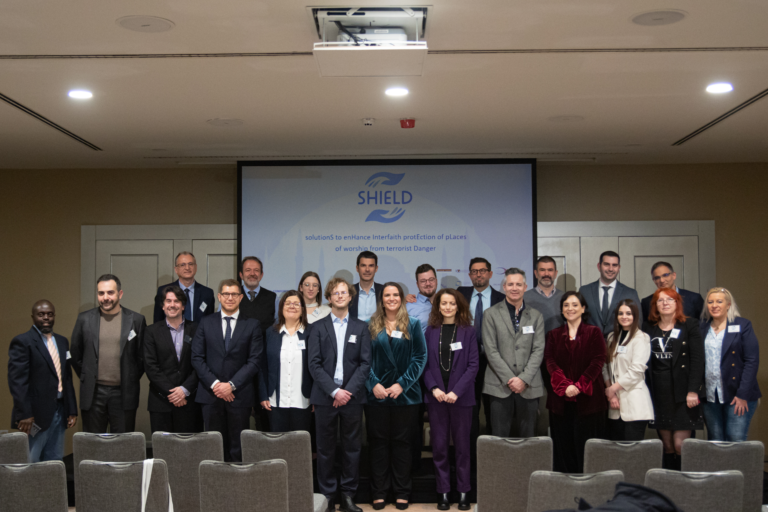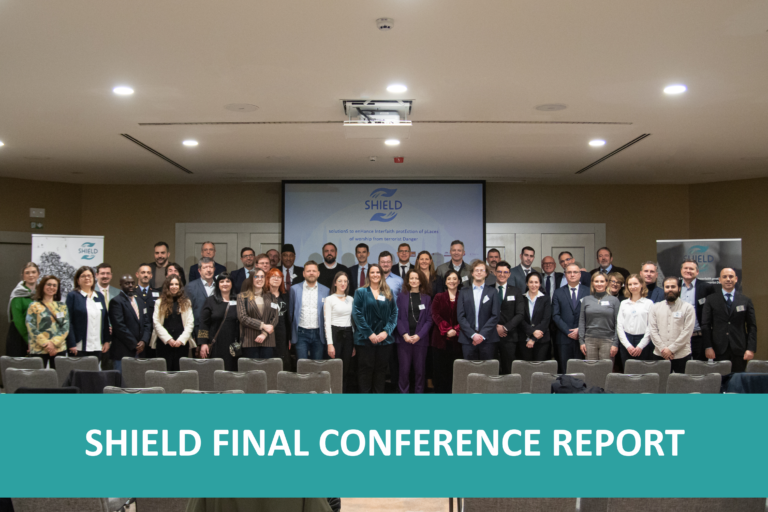Brussels – February 28th, 2024
The SHIELD project, an innovative initiative aimed at enhancing the security of places of worship, successfully convened its final conference on February 28th, 2024, in Brussels, Belgium. This milestone event brought together a diverse array of stakeholders, including security experts, policymakers, religious leaders, and representatives from sister projects, to explore strategies for safeguarding religious sites from potential threats.
The conference served as a platform to share the project’s latest developments and foster collaborative discussions on pressing security challenges facing places of worship across Europe. With a focus on promoting interfaith dialogue and enhancing resilience, the workshop featured insightful panel discussions, keynote speeches, and interactive sessions designed to facilitate knowledge-sharing and collaboration among all participants.
One of the highlights of the workshop was the presentation of the SHIELD Handbook, a comprehensive guide containing best practices and recommendations for protecting places of worship from terrorist threats. The handbook – a culmination of the project’s efforts – offers practical insights and actionable strategies for enhancing security measures while preserving the sanctity of religious spaces.
Throughout the day, participants engaged in discussions covering a wide range of topics, including vulnerability assessments, rapid response strategies, community involvement, and the role of technology in enhancing security measures. By leveraging a panel format aligned with each work package of the SHIELD project, the workshop provided a structured platform for showcasing the project outcomes and initiated dialogue on key thematic areas.
The event started, after a brief introduction, with a keynote speech by the EC´s Internal Security Fund program manager Tamara Muñoz, on the synergies between the different EC funded projects and overall importance of the protection of places of worship.

The first panel, “Vulnerabilities and Challenges of Places of Worship”, chaired by Alessandro Marani from Zanasi & Partners, featured an insightful discussion led by the distinguished experts Gábor Werner from Budapest University of Jewish Studies, Massimo Cozzolino from the Europe Islamic Association, and Edoardo Mattiello from the Fondazione Amici della Cattedrale di Novara. Their deliberations shed light on the diverse threats faced by religious sites, strategies for enhancing security measures while preserving inclusivity, and the pivotal role of community engagement in mitigating risks effectively.
Following a stimulating exchange during the morning sessions, the participants reconvened for the second panel, “Solutions and Responses to Potential Threats to Places of Worship”. This segment, moderated by Kristian Reeson from the European Organization for Security, featured expert insights from Patrich Antonello, Vice Commander of the Local Police of Treviso, Italy, and Dr. Patricia Villas-Boas, Deputy of the Security Team of World Youth Journey. Discussions focused on proactive measures, rapid response strategies, and the delicate balance between security and the essential openness necessary for maintaining religious spaces’ very own functions.
The momentum continued after lunch with the third panel, “Enhancing the Security of Places of Worship: Insights from the Sister Projects”, moderated by Niklas Hamman from SYNYO. Panellists from the sister projects SOAR, PROSPERES, SHRINES, and SPIRIT shared valuable perspectives on improving awareness, response capabilities, and long-term sustainability in safeguarding religious sites. Their contributions underscored the importance of collaboration and knowledge-sharing in developing comprehensive security strategies tailored to the needs of diverse religious communities.
The afternoon sessions culminated in an engaging discussion on “The use of Simulations for Security Measures and Awareness”. Led by Calin Rus from the Intercultural Institute Timisoara, participants explored the practical applications of simulations in trainings of law enforcement agencies and raising awareness among religious communities. Breakout groups facilitated in-depth discussions, allowing participants to delve into specific topics and share best practices for enhancing security preparedness and resilience.
The workshop concluded with the fifth panel, “The SHIELD Handbook and the Future Challenges in Safeguarding and Resilience of Places of Worship”. Moderated by Luca Guglielminetti from Spin System, panellists delved into the SHIELD Handbook’s recommendations and strategies for addressing future challenges in protecting religious sites. The dialogue with Giacamo Zarfati (Centro Internazionale di Ricerca Sistemica – CIRS and National Security Coordinator of the Union of Italian Jewish Communities) and Alessandro Calcagno (Commission of the Bishops’ Conferences of the European Union – COMECE) emphasised the importance of collaboration among all stakeholders as well as their engagement in ensuring the safety and security of places of worship for all communities from the European level to the national and local level.
Moving forward, the insights gained from this final workshop will inform future initiatives aimed at promoting religious freedom, social cohesion, and resilience in European communities. This was further reinforced through the results of a survey, send out to the participants after the final SHIELD conference, which highlighted the beneficial impact of the event and the introduced handbook, especially among the religious representatives.

